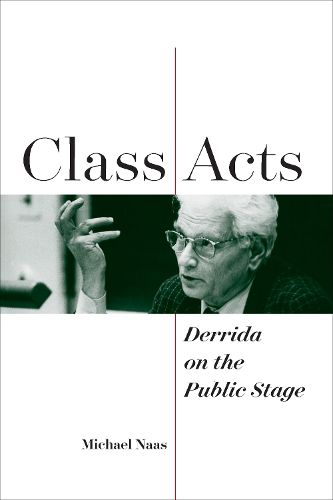Readings Newsletter
Become a Readings Member to make your shopping experience even easier.
Sign in or sign up for free!
You’re not far away from qualifying for FREE standard shipping within Australia
You’ve qualified for FREE standard shipping within Australia
The cart is loading…






Class Acts examines two often neglected aspects of Jacques Derrida’s work as a philosopher, his public presentations at lectures and conferences and his teaching, along with the question of the speech act that links them. What, Michael Naas asks, is one doing when one speaks in public in these ways?
The book follows Derrida’s itinerary with regard to speech act theory across three public lectures, from 1971 to 1997, all given, for reasons the book seeks to explain, in Montreal. In these lectures, Derrida elaborated his critique of J. L. Austin and his own subsequent redefinition of speech act theory. The book then gives an overview of Derrida’s teaching career and his famous seminar presentations, along with his own explicit reflections on pedagogy and educational institutions beginning in the mid-1970s. Naas then shows through a reading of three recently published seminars-on life death, theory and practice, and forgiveness-just how Derrida the teacher interrogated and deployed speech act theory in his seminars. Whether in a conference hall or a classroom, Naas demonstrates, Derrida was always interested in the way spoken or written words might do more than simply communicate some meaning or intent but might give rise to something like an event. Class Acts bears witness to the possibility of such events in Derrida’s work as a pedagogue and a public intellectual.
$9.00 standard shipping within Australia
FREE standard shipping within Australia for orders over $100.00
Express & International shipping calculated at checkout
Class Acts examines two often neglected aspects of Jacques Derrida’s work as a philosopher, his public presentations at lectures and conferences and his teaching, along with the question of the speech act that links them. What, Michael Naas asks, is one doing when one speaks in public in these ways?
The book follows Derrida’s itinerary with regard to speech act theory across three public lectures, from 1971 to 1997, all given, for reasons the book seeks to explain, in Montreal. In these lectures, Derrida elaborated his critique of J. L. Austin and his own subsequent redefinition of speech act theory. The book then gives an overview of Derrida’s teaching career and his famous seminar presentations, along with his own explicit reflections on pedagogy and educational institutions beginning in the mid-1970s. Naas then shows through a reading of three recently published seminars-on life death, theory and practice, and forgiveness-just how Derrida the teacher interrogated and deployed speech act theory in his seminars. Whether in a conference hall or a classroom, Naas demonstrates, Derrida was always interested in the way spoken or written words might do more than simply communicate some meaning or intent but might give rise to something like an event. Class Acts bears witness to the possibility of such events in Derrida’s work as a pedagogue and a public intellectual.